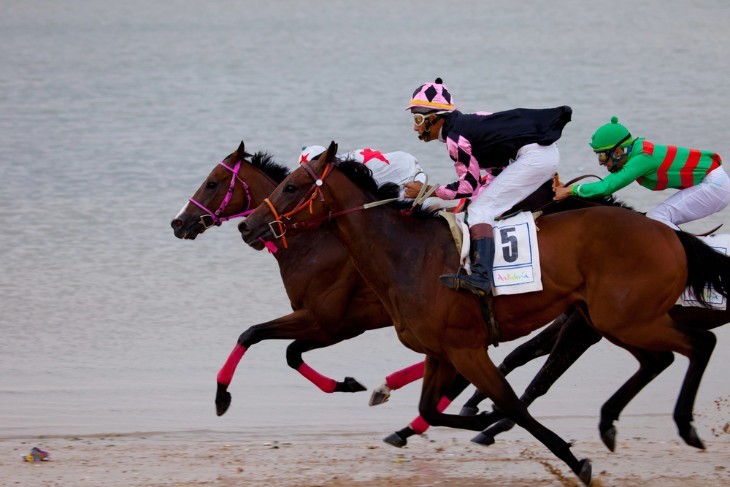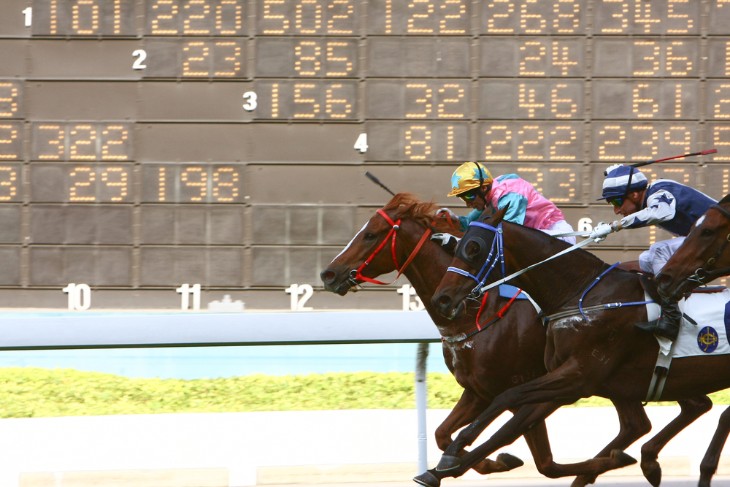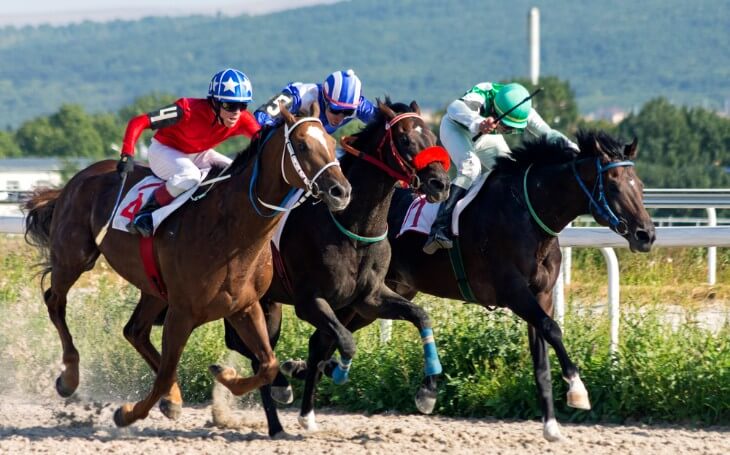Horse racing is a sport that's full of excitement, strategy and surprises and one such surprise is known as a "walkover." Despite its simplicity there's more to this unusual event in the world of racing. In this piece we'll delve into what a walkover entails, how it occurs, the consequences it carries and share some instances. Let's dive in!
Introduction to Walkovers
A walkover happens in horse racing when one horse is registered for a race. This means that no other horses compete in it, resulting in a victory without facing any opponents. While it may seem like an effortless win at a glance, walkovers are rare occurrences typically arising from specific circumstances.
How Does a Walkover Occur?
Some factors can lead to a walkover scenario, often leading to peculiar situations.
Non-Runner Withdrawals
One common cause of a walkover is when other horses withdraw from the race. Horses may withdraw due to injuries, illnesses, or unfavourable track conditions. If all the entries for a race are scratched except one, then the lone remaining entry secures victory by default.
Lack of Entries
On some occasions, races need to attract more entries. This can happen in smaller race meetings or less popular races where horse owners and trainers aren't interested enough. A walkover occurs when only one horse enters such a race.
Conditions of the Race
Some races have specific conditions under which horses may participate. These conditions may relate to the horse's age, previous performance record, or weight. Such situations result in "walkover" scenarios when only one of those horses meets these specified requirements.

'The Rules Around Walkovers
Even though getting into a situation whereby you have just yourself to compete with might feel like walking on air because there is no possibility of losing out, it is essential to note that set rules must be followed for such a walkover to be recognized.
'British Horseracing Authority (BHA) Regulations'
- Official Recognition: To be recognized as a walkover, the horse must appear in front of the stewards or enter the starting stall. This ensures that it is fit enough and ready to race. If not, it will not count as a walkover.
- Prize Money and Awards: Even if only one horse is in a race, its connections (owner, trainer and jockey) receive the prize. The race win goes into the official record of the horse's career record. Thus, equitability prevails, and honour is given to the horses even when they run alone in such races.
- The integrity of the Sport: To ensure that each walkover takes place transparently, BHA stipulates some requirements to uphold integrity in racing sport. This brings credibility and trustworthiness to all participants and fans involved in this competition.
Official Recording
- Racing Records: A horse's racing records officially include walkover wins. Therefore, despite not having any competitors during that particular match, the horse counts it as another victory. This accurately accounts for how well or poorly your steed has been doing on different occasions.
- Impact on Career Statistics: When they win from walkovers, these statistics are added to their overall career profile. This helps determine whether or not a horse remains valuable within the breeding or racing industry.' Owners can also enjoy an official win for their horses, which adds value to them.
- Transparency and Fairness: Keeping records of all races, including those with only one participant is essential. This practice will ensure that all sports events are transparent and fair. For instance, a race won by only one person can be recorded as a completed event.
What Happens in a Walkover?
In the event of a walkover, several aspects must occur for the race to be regarded and the victory properly recognized.
- Prize Money and Recognition: The horse and its connections (owner, trainer, and jockey) receive prize money. On the other hand, it is recorded as a win in the horse's career statistics, contributing to its future value and breeding prospects.
- Experience for the Horse: On the one hand, a drawback of walkovers is that they must provide horses with experience similar to that gained from competitive races. A walkover robs it of such an opportunity because competing against other horses is crucial for their development and fitness.
- Betting Implications of a Walkover: For those interested in betting on horse racing, here are some reasons why walkovers count.
Betting Cancellations
- Refunding Stakes: Walkovers make bookmakers void all bets placed on that race, meaning that every bettor gets back their money. This means that any person who has put either winning or losing stakes will not get anything because no competition exists.
- Impact on Bettors: Losing out on potential winnings is one thing, but getting somebody to win can be disappointing. They might have spent time researching and choosing which horse to put their money on, only for it to be declared a walkover. This derails their betting strategy for that day.
- Adjusting Strategies: During a walkover, bettors must adapt their strategies accordingly. This could mean looking for another race to bet on or adjusting plans for remaining racing events. The uncertainty this brings about makes betting on horses even more intricate.
Impact on Betting Strategies
- Unexpected Changes: A change of plan can result in some ad hoc changes applied by gamblers when faced with sudden changes like W/O's. Some people may have been careful enough while planning which horses would run against each other, only to find out that the race is now a walkover. This means that another betting strategy must be formulated with minimum delay.
- Finding New Bets: On many occasions, people who bet on horses will search for different races where they can also place their bets. For instance, it could mean looking for a race where the odds are better, or such an opportunity becomes available due to a walkover. It might not be easy, mainly if the bettor had a lot of faith in the original choice.
- Reevaluating Risk: Some factors may lead bettors to reevaluate risk. Since their selected horse won't compete against any other horse, they might think twice about how much money should be bet on subsequent races. This will likely make them place safer bets or change stakes at various places.
- Adapting Quickly: Being successful as a gambler means adapting quickly when circumstances change, such as walkovers. Successful betting requires flexibility and contingency plans. Adaptability is critical when maintaining a winning strategy in the unpredictable world of horse racing.
Some Examples from the Past
Though seldom, walkovers are a part of horse racing history. Some examples are given below.
Frankel's Walkover
Frankel, one of the most famous horses in history, walked over in 2012 because several potential competitors withdrew from the race. Even though Frankel enjoyed an easy victory, many people suggested it was not a true reflection of its running abilities.
Due to his fantastic speed and dominance on tracks, this walkover only added another win to its unbeaten record. Nevertheless, his career as one of the greatest racehorses ever remained illustrious throughout his lifetime. Even a walkover can be essential to a legendary horse's journey in racing history.
Other Notable Walkovers
Walkovers have been few, but they have occurred during renowned races at some point in time. For instance, Desert Orchid went through a walkover at Tingle Creek Chase in 1999. Following withdrawal by other entries, no other runner was present except him, known for being physically and technically strong. This was another achievement he recorded after this match.
Another example is when Nasram II won by walkover in the King George VI and Queen Elizabeth Stakes while running at Ascot in 1963. Reasons for pulling out varied among different runners, leaving behind just one competitor who managed to finish without any hindrance, which could have reduced the magnitude of races or the performance of such valuable animals.
These examples illustrate that although unusual but high-profile races still suffer from occasional walkovers, they underscore the uncertainty associated with horse racing and how it can lead to such outcomes. These victories mark milestones in equestrian sports, even without competition.
They also indicate special conditions under which horse races may sometimes occur: trendy ones like these two assembled here do not allow for any contest.

The Outcome Of Walkovers In Horse Racing
Walkovers might be considered a trivial aspect of horse racing, but they are essential for many stakeholders involved in the Sport.
For Owners and Trainers
Walkovers do impact owners and trainers. On one hand, they secure a win and monetary reward, which is always a plus. This can increase the horse's winning record and its sale value. However, this kind of walkover deprived the horse of an opportunity to compete against its fellow racers.
Consequently, the absence of competition may hinder a racehorse's development towards its next task. Owners and trainers should weigh up between easy victories that might benefit their horses' careers but not necessarily develop their racing experience. Notwithstanding these mixed feelings, a walkover adds value to one's professional life.
For The Racing Community
The racing community views this event as unique because it shows how unpredictable races can sometimes be. This is an often forgotten fact by people involved, including fans who place bets hoping on specific outcomes only to end up disappointed. Besides, it once stressed that every racehorse must be ready and healthy enough at the start line before competing in any event.
When horses are withdrawn from participating countries, such decisions usually come from trainers or even veterinarians, indicating thinking about animals' welfare. Walkover does not excite bettors like competitive races do. Still, it plays a part in horse racing's bigger picture, making it so honest that equestrian activities would have been conducted fairly and openly if just one runner were taking off.
Conclusion
Racing horses often show walkovers, which makes it different from other sports that are dynamic sometimes and may not go as expected. Walkovers happen when only one horse can compete in a given race, leading to automatic victory. These victories are not frequent, but fans who know what they mean will love the many hidden things about horse racing.
Horse racing has a unique feature called "walkovers," which demonstrate the dynamism of this Sport and how unpredictable it can be. A walkover occurs when only one horse remains in a race; thus, the horse automatically wins. It is relatively rare for walkovers; nevertheless, understanding them enables fans to enjoy all aspects of horse racing.
For more information:








